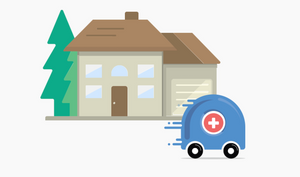As COVID-19 rises, so does Telehealth. Doctors are coming home. The death of a "smart pill". And much more in the world of Agetech...
COVID-19 has been taking its toll on all of us in one way or another, I hope you’re all staying healthy and safe. Unsurprisingly it’s having a particularly devastating effect on elder care, and providers are scrambling to figure out how to provide care while limiting the risk of exposure to both its clients and staff. The tiny silver lining to the pandemic is that these organizations, which have generally been hesitant to adopt new technology, are now welcoming any innovation that they think might help. In terms of technology adoption, 10 years of progress has been made in the last 3 months.
With so much happening we’ve had to change the format of this newsletter, there’s just too much news to fit! So while we’ll still provide brief analysis on the bigger news items, we’ll list the rest briefly and provide links if you want to dive deeper. We’ve also changed platforms to Substack, which is better for newsletters like this.
Read on to find out all that’s been happening in Agetech, and as always if you have feedback or a funding update please reach out or leave it in the comments below.
Highlights
🎊 Telehealth is booming - United Optum purchased AbleTo just months after scooping up Vivify Health and PatientsLikeMe
Telehealth is having its day in the sun. With the COVID-19 pandemic spreading and stay-at-home orders being issued throughout the country, providers and patients alike are being forced to quickly adopt virtual solutions, causing an explosion in Telehealth usage. Like other providers of remote health services, particularly in the area of mental health, AbleTo is seeing increased demand as people across the country deal with the medical and economic fallout of COVID-19. Ginger, a startup that provides on-demand mental care, has reported a 50% increase in utilization since the pandemic began.
This move makes a lot of sense for insurance giant UnitedHealth, which has come under fire for reportedly denying mental health treatment to its customers. Whether or not that’s true, by acquiring AbleTo it’ll be able to provide better mental health services to its members for a fraction of the cost.
Even before the pandemic, the remote mental healthcare space was heating up, with startups like Talkspace raising over $100m and larger players, like Teladoc and Amwell, increasingly investing in their offerings. There’s still a lot of room to grow, I expect we’ll be seeing a lot more activity in this space.
“Mismatch between supply and demand for mental health services is massive and growing, making virtual care models that scale a winning value proposition. Without the stigma associated with in-person visits, removing barriers to care-seeking may free up latent demand for service growth.”
Click here for more coverage of United's acquisitions.
It’s not only telehealth that’s thriving: on-demand doctor home visit service DispatchHealth raised $135.8m
If Telehealth is about providing care across distance, DispatchHealth is the opposite. Essentially an urgent care clinic on wheels, patients and providers can request care from the app and within two hours arrives a fully-equipped medical team ready to tackle just about anything.
Part of the larger hospital at home movement, DispatchHealth partners with insurers to reduce the enormous cost of facility-based care, currently around one-third of total healthcare spending here in the U.S. It estimates that in the 7 years and over 170,000 patient visits provided since founding, more than $200 million in medical expenses has been saved via avoiding hospital and skilled nursing facility admissions. It’s not alone in this space however, competitor Heal has raised over $71m and is nipping at its… heels. Sorry, I couldn’t resist.
“Home is increasingly the place where people prefer to receive their care. This is especially true for older adults with multiple chronic conditions.” Susan Diamond, Segment President, Humana.
For more on DispatchHealth, click here.
☠️ Once valued at $1.5b, ingestible medication adherence sensor startup Proteus Digital Health filed for Bankruptcy
Proteus just added itself to the list of over-hyped startup failures, next to the likes of Juicero and WeWork. Like those companies, Proteus championed an exciting product - a “smart pill” that can track medication adherence from inside the body - but despite raising more than $500m failed to create a viable business. We can learn some important lessons here:
- Keep burn rate under control. At the end Proteus was burning too much cash, around $2 million a month, despite not having a clear path to profitability. Unsurprisingly, investors weren’t willing to throw more money into the fire.
- Don’t put all your eggs in one partnership. The $88 million deal Proteus signed with Otsuka in 2018 was a big score, but when the pharma giant pulled out earlier this year they had nothing to fall back on. This shouldn’t have come as a surprise given the fickleness of big pharma, just last year Novartis' Sandoz dropped out of its deal with Pear Therapeutics and Sanofi pulled back from its three-year-old relationship with Verily.
- Don’t assume people will use the product just because it’s “cool”. Proteus’ device doubled the monthly prescription cost. Even if hadn’t blundered by initially targeting a condition that causes paranoia and distrust of technology (schizophrenia), neither payers nor patients were willing to front the cost.
“I think the key issue here is ‘So what? So, you have a cool technology. A cool technology by itself does not make a successful business.'"
Click here to dive deeper into Proteus.
In other news…
Amwell, the telehealth platform, raised a $194m series C and only weeks later filed for an IPO (link)
Lifesprk, the innovative home care agency, raised a $16.1m series A to launch its Electronic “Life” Record (link)
Cariloop, the family caregiver support platform, raised a $6m series A to double its staff and quadruple the number of caregivers on its platform (link)
🎊 Omada Health, the chronic disease management digital therapeutic, raised $57m to acquire Physera (link)
Wellth, the behavioral economics based Medication adherence app, raised a $10m series A to expand into new use cases (link)
Heart Health Intelligence raised $2.2m to build a smart toilet seat (link)
MyndYou, the AI voice diagnostic platform, raised a $3m series A to extend care to isolated older adults (link)
Pager, the all-in-one care coordination app, raised $33m in equity & debt to expand into South America and beyond (link)
🎊 Supercarers, the platform to find home caregivers, was acquired by Home Instead UK for an undisclosed amount (link)
CareAcademy, the professional caregiver training platform, raised a $9.5m series A to help more care workers upskill (link)
Element5, the home care back-office automation company, raised a $2.5m seed to start selling into home care agencies (link)
Routinify, the remote home care platform, raised a $1.5m seed to begin sales to consumers and home care agencies (link)
Conversa, the chatbot-based remote patient monitoring solution, raised a $12m series B to become the “digital front door” to care providers (link)
🎊 CareZone, the medication management app, was acquired by Walmart for an undisclosed amount (link)
🎊 Unite Us acquired SDoH (social determinants of health) predictive analytics tool Staple Health for an undisclosed amount (link)


Join the conversation